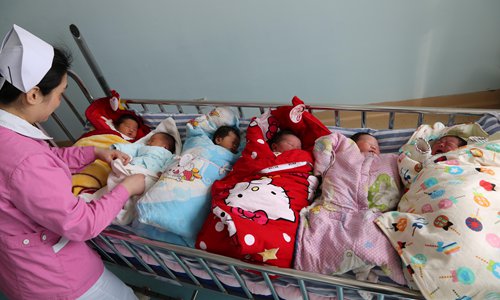
A nurse attends to newborn babies at a hospital in Xiangyang, Hubei Province. Photo: VCG
Chinese lawmakers have proposed during the two sessions that three provinces in Northeast China should fully lift the family planning policy to offset the region's aging population, but demographers and netizens said such a move won't address a brain drain that's being driven by stagnant economies.
Chen Xiangqun, an NPC deputy and executive vice governor of Liaoning Province, proposed lifting the family planning policy in Liaoning, Jilin and Heilongjiang provinces, and increasing investment in child care and preschool education.
Deputy Liu Hong, who is also the president of Dalian University of Foreign Languages, made a similar proposal that involves subsidies and tax cuts to encourage couples to have more children.
Liaoning's population fell 0.08 percent in 2019 to roughly 43.5 million. About 25 percent of them are above 60 years old.
China as a whole saw 580,000 fewer newborns in 2019 than in 2018, marking the third consecutive year of decline since the implementation of the universal two-child policy in the mainland, according to official data.
Supporters argued that the whole country should consider lifting the birth restrictions and some deputies have proposed furthering the two-child policy to allow a third child. The idea is to encourage young people to have children.
But Northeast China faces another problem in addition to a low birth rate: a brain drain and stagnant local economies.
"Even if people are born in the region, they'll prefer to work and live in big cities and coastal areas," said a net user on Sina Weibo.
All three provinces recorded GDP growth rates slower than the country's average and declined in GDP per capita.
Zhai Zhenwu, president of the School of Sociology and Population Studies at the Renmin University of China, told the Global Times that, based on his studies, the fertility rate of women in the three northeast provinces has been low for a long time, averaging around 1.2 children per woman compared with the country's 1.6-1.7.

